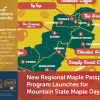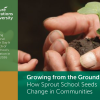Dr. Naomi Bates joined Future Generations University to bridge the divide between science and communities.
By University Staff
After making the list of finalists for the Westinghouse Science Talent Search, the nation’s most prestigious science contest for high school students, after a Ph.D. at Princeton, after engineering consulting and laser terrain mapping work, Naomi Bates moved back to West Virginia, to a farm 20 minutes away from where she grew up.
She could have gone anywhere, taken any job. She returned to Pendleton County for more than a homecoming—it was the realization of the type of career and impact she wants to have, the fruition of a process started more than a decade ago at Princeton.
“I’ve seen too much good science and engineering get stuck on the shelves of libraries,” she explains. Math and science alone aren’t enough to make a difference in peoples’ lives—and Bates came to Future Generations University to help bridge the divide between scientists and communities so research can inform decisions on the ground. “It won’t do a bit of good if you publish a paper and nobody reads it. That’s why I love the applied natured of our program, doing research with communities and giving students technical skills.”
Now Bates splits her time between teaching, research, and her 100-acre farm where she keeps a menagerie with chickens, sheep, a hog, dogs, and cats. We spoke with her about what brought her back to West Virginia and to Future Generations University, why she believes in applied learning, and how she transitioned from astrophysics to bioacoustics.
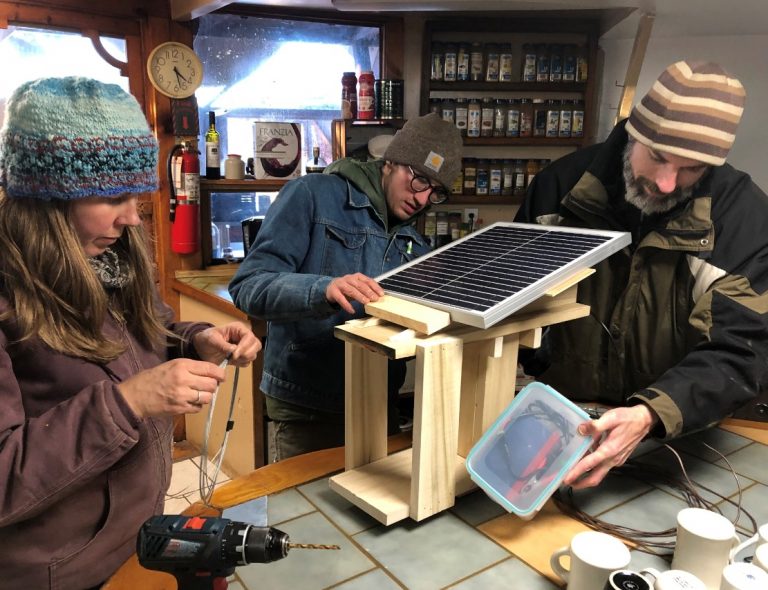
You had a childhood interest in physics and astronomy. What brought you back to earth to focus on conservation, hydrology and climate change?
In my senior year in high school, there were two 100-year-floods in my county. I saw the impact on the community. Growing up in rural Appalachia, I lived in some marginalized areas and had seen a lot of poverty. When I went to college, I started as an astrophysics major but I didn’t want to spend my life in front of a computer. I wanted to do something that impacted people. At Princeton, I saw the disconnect between people with no experience of the realities on the ground. They’d ask, ‘why do they build in a flood plain.’ Well, I’d seen the impact of floods on people and I knew that sometimes the coal company owned everything else. David Billington, a renowned civil engineer and professor, said something in class that stuck with me: there are plenty of great engineers, but not a lot of people making their work accessible. We have to bridge that gap. I’ve switched fields, starting in astrophysics and radio astronomy, into hydrology and water resources, now into bioacoustics. What drives me is people and solving problems.
What attracted you to Future Generations University?
I had been doing engineering consulting work, hydrodynamic modeling and working with Lidar (light detection and ranging) vegetation and terrain data, and sea level rise mapping. I wanted to make a shift to more people-oriented work, to work with communities and not just in labs. It’s a hard jump to make and I needed a place that was willing to work with me, that believed in me and the pursuit. I felt so boxed in by technical work and I didn’t want to play the tenure game. Future Generations is a different type of scholarship, a whole new way of presenting results.
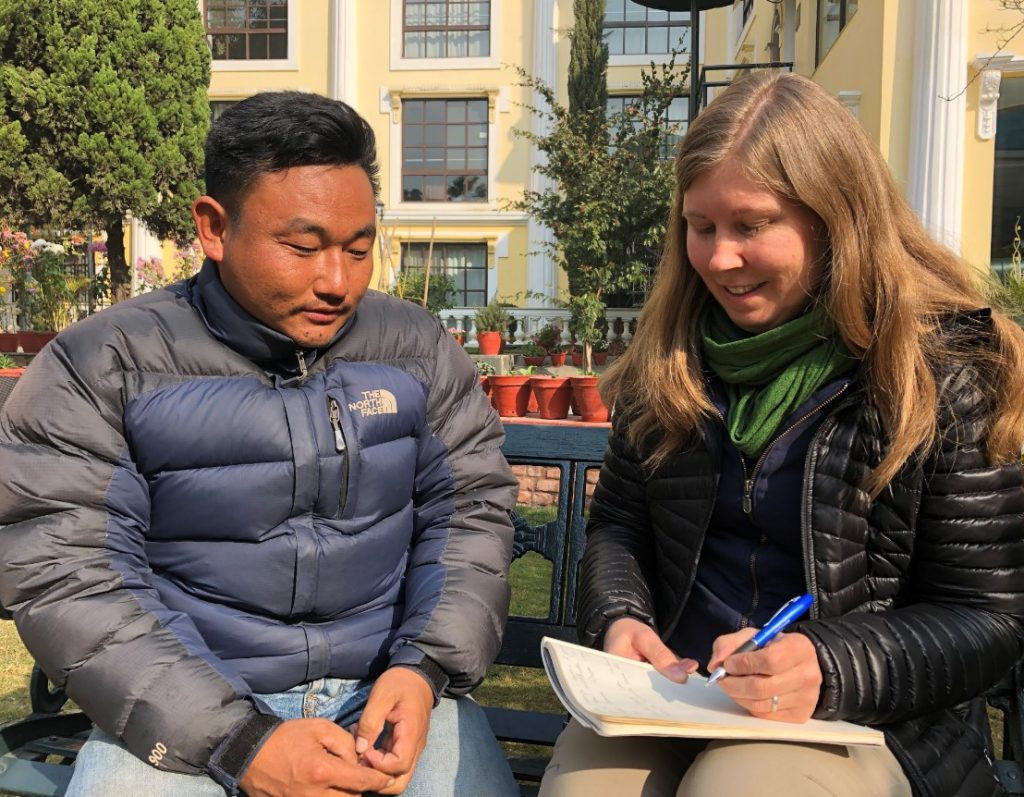
Future Generations University is a fundamentally optimistic place. You don’t teach applied development if you’re a cynic. What makes you believe in your work?
I can be skeptical about the bigger picture—about politics, the prospect of ending climate change, or COVID-19. Those things can be depressing. But I believe in people. I believe in human energy. And I believe in small, grassroots change. I’ve seen it in Appalachia. I am optimistic because our students are incredible. I learn so much from them, from the different journeys they’ve taken to come to Future Generations and knowing how they’ll bring the skills back with them to their communities.
You teach strategic resource mapping and professional presentation. Why are those the classes that you wanted to teach?
Our brains process information differently when it’s displayed spatially. You can look at a table of numbers and get one thing from it, but maps turn information into relationships. I want my students in strategic resource mapping to understand spatial thinking, to be able to interpret data and use data and mapping to tell stories. Those skills will help them solve problems in their community. And professional presentation may be the most applied and useful class we offer. It helps students transition from graduate school and accelerate their career, ensuring they can connect all of their academic work to their career goals. I believe in our students and I want them to get where they want to be professionally.
What makes Future Generations University unique for students?
We view students as individuals. We’re flexible. And we want students to succeed. Our students are incredibly dedicated to their learning and to furthering their community work. They’re doing this with full time jobs and families. Sometimes, they’re commuting hours to find internet. They’re persistent and determined to make a difference. So we share that mentality and work with them while maintaining the rigor of a Master’s degree. If an assignment isn’t turned in on time, we don’t just mark it a zero. Students have varied backgrounds and often don’t have the same academic backgrounds, so as a teacher there’s a lot of listening and adapting to their needs while ensuring rigor. We’re not looking for boxes to tick. We’re creatively moving every student along on their learning journey, ensuring they have the skills and quality lessons they need. And then there’s our flexible learning solutions, informal courses, independent study options and internships. We work with students so they can pursue something they are passionate about.
On top of teaching, you’re also a research faculty member, directing the Songs of Adaptation project. Why does that project speak to you?
Dr. Tirtha Shrestha, one of the three founders of the project, talks about how with climate change, the trees are walking uphill as ecozones move up the mountainside. Leave it to a poet and botanist to describe it so beautifully. Songs of Adaptation is using sound for long term monitoring, to listen as nature talks and adapts, transforming mountain transects into measurement yardsticks. It involves big data, environmental monitoring equipment, machine learning, and community partnerships. A board member described it as the canary in the coal mine recently. Nature is talking. We need to listen. Communities know that things are changing, and we can integrate scientific evidence and local knowledge to help create a more informed, sustainable path, so communities can adapt to what’s coming.
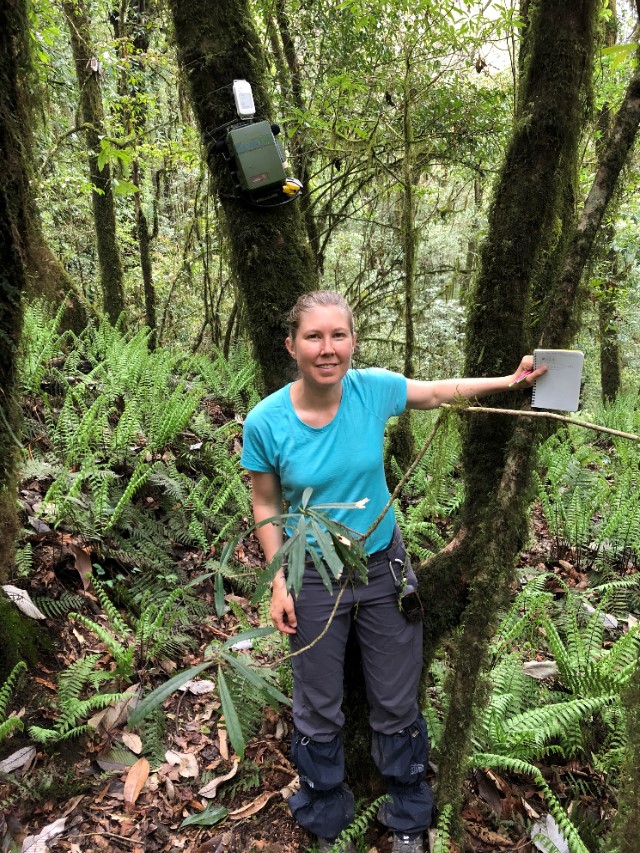
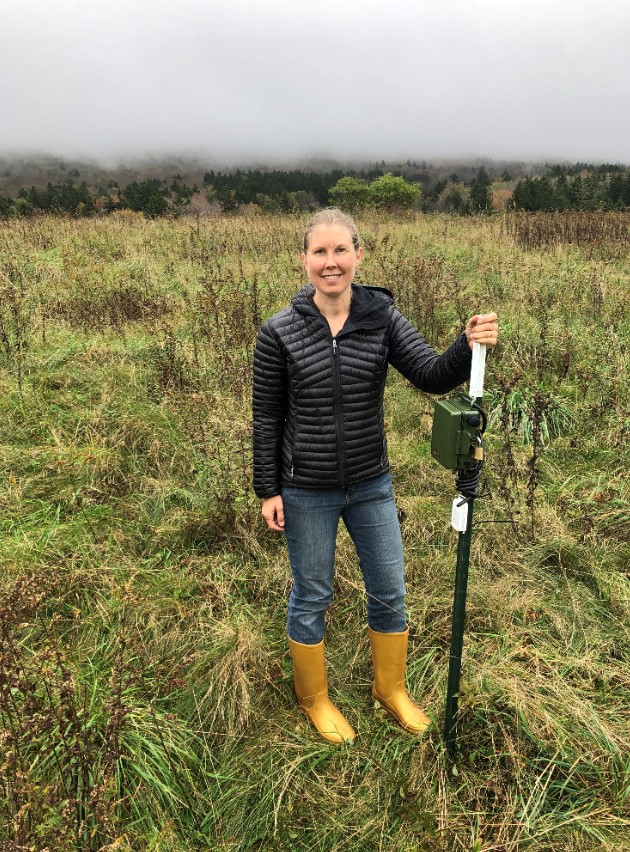
Her research takes her around the globe, from the Barun Valley in Nepal to the Amazon Rainforest in Bolivia, while her students similarly come from many countries, creating a rich classroom experience.
You came to Future Generations University because you wanted to bridge the divide between science and community. Now you’re leading a project that quite literally straddles the two. Can you reflect on that?
I feel very fortunate. And I’m still learning to navigate the divide. I can’t sit on my mountaintop in West Virginia and pretend I know what the reality is on a mountain in Bolivia or Nepal. I don’t. That’s why we have to work with people who are actually there, who know the political, economic, cultural and social structures. As a scientist, I get excited about technical work and numbers. I need to remind myself that while I’m interested in patterns and details, people in Shishila, India want to know where to plant their crops or what’s happening with rainfall. Climate change affects livelihood, health, food security. I’m fortunate that I can help communities adapt while listening to nature.
*This interview has been edited for length and clarity

